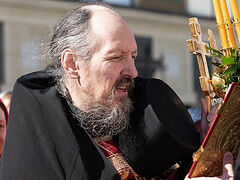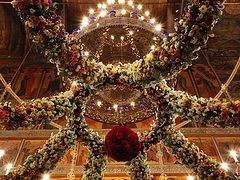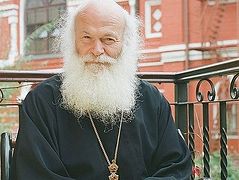Passing from one feast to another, we’ve already imperceptibly come to the foot of the Mount of Olives, and we proclaim for the last time: Christ is Risen! Many of us will undoubtedly be vouchsafed to again behold and hymn the day of the Resurrection; but some of us—and this is also beyond doubt—will celebrate, if we’re found worthy, the next Pascha in the “day without night” in the Kingdom of Christ. Who are the former and who are the latter? We don’t know. We know only that every one of us can belong to the latter. And that’s why many people spend this present day in some kind of despondency. It would be preferred if the joyful chanting never ends, if we never part with this bright celebration!
But is it really impossible, brethren? Are there really no means to continue, in full force, not the day but the joy of the Resurrection of Christ? This is precisely what everything in Christianity is directed towards; in this lies the truest Christianity. For what does it consist of? Isn’t it in the renewal of the spirit, in receiving a new heart from above, in resurrecting with Christ? Whoever has truly resurrected in spirit, for him the whole rest of his life is a celebration of the Resurrection; every day is bright for him, and he constantly says with all his deeds: “Indeed Christ is Risen!” Therefore, whoever doesn’t want to part with the triumph of the Resurrection, let him know that he doesn’t have to, that there should be a constant resurrection within him! For this purpose, the holy Church renews the memory of the Resurrection of Christ every six days, making it clear to everyone that this celebration, sooner or later, must become a continuous one for a Christian.
“But the means to this,” some may think, “is so great and complex that it can only be for the very few to make active use of it. Are there that many who can boast in their spiritual co-resurrection with Christ?” Truly, brethren, there are few. But this is our fault, and the greatest fault, for this resurrection must necessarily belong to each and every one of us. In this, as we have said, is the very essence of Christianity. Without it, there is not and cannot be true Christianity.
These aren’t my thoughts and conclusions, brethren. Peruse the writings of the Apostles of Christ: There you’ll find on every page that a Christian is a renewed, resurrected, newly created man. Therefore, when the means we’ve proposed to someone for prolonging the joy of the resurrection through the renewal of the whole spirit in Christ seem to be out of reach, only for the few, it’s a clear sign that such a man isn’t simply not a true follower of Christ, but also doesn’t know what is required for this following—that it’s completely impossible without the renewal of the spirit. Such a man must therefore try not to continue the joy for himself, whatever it may be, but to produce in himself a spirit of contrition for the fact that he has hitherto borne the name of a Christian without caring about actually being one; that is, to acquire a new heart and a new spirit—the heart of God, the spirit of Christ.
Let’s turn to the feast. Thus, we must now celebrate, in the words of the Church, the “Leavetaking” of the Resurrection of our Lord. What should this leavetaking consist of? Clearly not simply in the abbreviated repetition of the festive Divine service and not simply in the ending of the joyful hymnody: This would be a leavetaking on the lips, but the Lord wants our heart. That’s not what He gave for us, and it’s not what we must give to Him. Let us give Him our mind, that it may be Christ’s; may there not be any high thing that exalteth itself against the knowledge of God (2 Cor. 10:5), not a single bit of darkness under the guise of light. Let us give Him our heart, that it may be Christ’s: free from partiality to the world and its blessings, ever striving for where its eternal “treasure” is to be found (Mt. 6:21). Let us give Him our will, that it may be Christ’s: enclosed in His holy Gospel, swift to every good deed, yet motionless towards evil. Let us give Him our soul and body and out entire life, that it may also be hid with Christ in God (Col. 3:3); let us live not so much in ourselves as Christ in us.
Let us give ourselves, for no matter how much we give ourselves over to Christ, our King and God, we’ll never be able to give ourselves to Him as He gave Himself for us, and continues to give Himself to all of us in the Sacrament of the Eucharist. Such giving of ourselves to Christ will be the best preparation for the celebration of the Ascension of Christ. If our mind and thoughts belong to Christ, then they won’t remain on Earth; we will look not at the things which are seen, but at the things which are not seen (2 Cor. 4:18), and set [our] affection on things above (Col. 3:2). If our hearts and minds will belong to Christ, they won’t wander along the earth, but will seek those things which are above, where Christ sitteth on the right hand of God (Col. 3:1). Our very flesh, belonging to Christ, will begin to forget its frailty, to rise in the morning to the Heavenly Jerusalem, to yearn for the Heavenly dwellings. And the most merciful Christ won’t lose His people forever on Earth. He’ll come to them, according to His immutable promise, and take them to where He is now (Jn. 14:3), and He will be with us all by His grace and love for mankind!
Amen.




